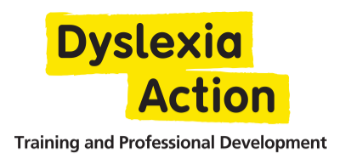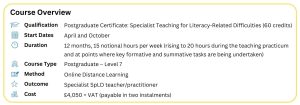

 Site Navigation
Site Navigation


The Dyslexia Action Postgraduate Certificates, Diploma and MEd qualifications are a unique and prestigious programme at Master’s level 7 that provides training to become informed practitioners and specialist teachers and/or assessors.
This programme was developed and is delivered and assessed by Dyslexia Action, awarded by and quality assured by Middlesex University. The courses are modular and flexible and are undertaken part-time, through online learning. Access is available 24/7 to the Virtual Learning Environment and all modules are tutor-supported through online forums.
If you do not hold a degree then please see our Level 5 CPD Pathway SpLD Teacher/Practitioner Route.
In order to achieve this qualification, you will have to complete the following modules:
Delegates completing this Certificate will gain the skills and knowledge to:
The Certificate is split into two modules:
The Dyslexia Action Postgraduate Certificate and Diploma Programmes in literacy-related difficulties are appropriate for a wide range of professional teachers and specialists who have a relevant classroom or student learning support experience including:
QUALIFICATIONS
Prospective students will have:
Please note: We reserve the right to reject any application that does not meet the criteria specified.
If you cannot commit to 15 notional hours per week (rising to 20 hours during the teaching practicum and at points in other modules when key formative and summative tasks are being undertaken) or do not hold a degree you may be interested in our alternative Level 5 Diploma in Specialist Teaching for Literacy-Related Difficulties (DIST) CPD Pathway or graduate routes
Are there any live tutorials?
There are no ‘live’ one-to-one tutorials or meeting provisions within the modules or requirements to be online at particular/set times of the day).
Supervised Teaching
The learner selected for the teaching intervention programme must be available for the duration of the teaching practice (around 14 school/college weeks). If the learner is going to be away for more than a week during the teaching practice, she/he may not be suitable for this intervention, similarly learners taking examinations may not have the time or focus to fully engage. Tutors will advise on the suitability of chosen learners, based on the information provided, but it is the responsibility of participants to find and select suitable learners. Lessons must take place as face-to-face sessions; no on-line version of the teaching programme is currently offered.
See: Programme syllabus above for further details.
Working with a learner
Participants are required to find learners whose main difficulties are with literacy and who are not currently receiving any other form of specialist teaching support.
See: Programme syllabus above for further details.
Required Teaching Practice Hours
Dyslexia Action requires you to undertake a minimum of 20 hours of teaching support during the teaching practice. At least 10 hours of teaching support should be done with one learner individually (not in a group setting). The remaining hours can be carried out with either the same learner or another learner (or a small group of learners). Lessons normally take place on a weekly basis allowing lesson plans to be developed, resources to be prepared and tutor feedback given. Individual lessons can be scheduled for one hour or one-and-a-half hours with the learner (as appropriate for the age and profile of the learner).
Required Teaching Practice Hours
Teaching practice and assessment administration
Participants working with children can only teach a learner within a DfE registered state or independent school with a Unique Reference Number (URN). See: get-information-schools.service.gov.uk/Search for details of how to find details of schools and schools’ URNs (this does not apply to those based overseas, although the school or college should be a registered organisation through the state authority).
It is not permitted for participants to undertake teaching practice or assessment administration in their own home or the learner’s family home.
Will I need a DBS?
As a Disclosure and Barring Service Enhanced Disclosure is a requirement for working with children and young people, the person you choose to use for any practical teaching should be someone within your school or workplace, where you will already have a DBS Enhanced Disclosure. We reserve the right to request your DBS information from you. For further information please visit this dedicated page here.
Further details can be found in the Programme syllabus document above.
The assessment strategy for this programme covers both theoretical and practical elements and is designed to develop practical skills in specialist teaching and assessment and encourage evaluation of the research and evidence-based, so that theory is integrated into practice. A combination of assessment tools is used and these include:
After completion of the Postgraduate Certificate Specialist Teaching for Literacy-Related Difficulties (DAPP21-01 and DAPP21-02) you can move on to study Modules DAPP21-03 and DAPP21-04 which will enable you to become a fully qualified Assessor and give you eligibility to apply for an Assessment Practising Certificate. For full details see programme syllabus document above.
The Dyslexia Action Postgraduate programme is a competency-assessed course at Level 7, Master’s level, which requires tutor assessment of the candidate undertaking teaching and assessment. This means that other academic programmes that have not included competency assessment or are at a lower level (e.g. Level 5 or Level 6) will not qualify for accreditation of prior learning (APL).
For further details see: Recognition of Prior Learning
1 April 2025 Cohort*
*applications close Sunday 2 March 2025, or sooner if the course is full)
Please note:
Professional Practice Materials
Applicants should note that the Dyslexia Action Postgraduate Certificate and Diploma qualifications are intended for individuals who wish to work as specialist literacy teachers and/or assessors in educational settings.
The Diploma modules will require significant investment in psychometric assessment test materials which is in addition to the course fees. There is a student Study Purchase Scheme for key assessment test batteries operated by the Dyslexia Action Shop. These test materials are resources that you will be able to use in your future professional practice once you qualify. You may also be able to borrow tests from your school or college or for a limited time from the Dyslexia Guild Library.
You will be sent a full list of required resources including assessment tests, practical teaching materials, once you have registered for the course.
Dyslexia Action courses have been in existence for 50 years and have a national respected profile in specialist teacher training and support. Our courses meet several accreditation criteria reflecting the importance we place on the quality of our courses and high standards of teaching and learning which are intrinsic to our programmes.
The Postgraduate Certificate: Specialist Teaching for Literacy-Related Difficulties confers eligibility for Associate Membership of The Dyslexia Guild (ADG) recognised as the first grade of professional membership for a specialist teacher/practitioner. This programme was developed and is delivered and assessed by Dyslexia Action, awarded by and quality assured by Middlesex University. This means that you will receive a Middlesex award upon successful completion.
British Dyslexia Association for Approved Teacher Status or Approved Practitioner Status – ATS/APS (subject to approval) and PATOSS for Associate membership.
Candidates will automatically become student members of The Dyslexia Guild for the first year of their course while they are actively studying on a Postgraduate Certificate: Specialist Teaching or Postgraduate Diploma: Specialist Assessment and Teaching Programme with Dyslexia Action. The Guild is a membership network and professional association for practitioners in Dyslexia and SpLD, which aims to promote discussion, information and best practice as well as keep members informed of developments in the field through publication and distribution of topical news, updates and maintenance of an up-to-date library.
The Guild provides its members with a wealth of information relating to dyslexia and SpLDs through its online library (the National Resource Centre for Dyslexia), a single-easy to access online platform that produces focused search results accessible by members 24/7. The library is supported by a Chartered Librarian and provides a unique, e-resource collection, covering the fields of dyslexia and other co-occurring difficulties. Participants have access to an online collection of over 800 specialist e-books, hard copy books and resources as well as simultaneous access to an online EBSCO database of over 1,600 full-text education and psychology journals.